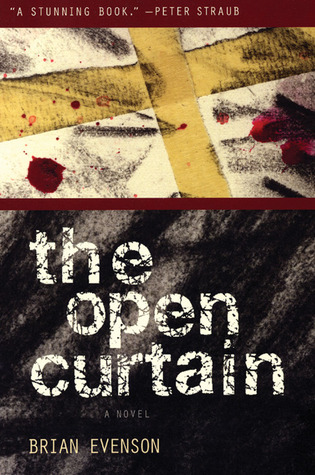The final fifty pages of Brian Evenson’s new novel, The Open Curtain, contain some of the most stunning and virtuosic fiction I have ever read. Seriously. The ending is so perfectly executed that I’m not even going to review it for you for fear of compromising your enjoyment of unforgettable artistic achievement. Instead, I’m going to limit my discussion to the first part of the novel, before the grand finale. Trust me on this, OK? After you’ve read the book, send me an email and we can talk about it then.
Our hero is teenager Rudd Theurer, a troubled only child whose father has committed suicide and whose mother is a strict Mormon and a nutcase:
The car was gone, his mother already at church. She had left his black leather-bound scriptures on the kitchen table. Next to them was a crudely drawn map to the church, with just two squares indicated, one marked “House,” the other marked “Church.” An arrow pointed from the first to the second. “In case you forgot the way,” was written on the bottom. On the table she had also spelled out the word hell in white grains that he took for salt but which, tasting, he found to be sugar. As if the chief torture of hell were tooth decay.
No wonder this kid has problems. While rifling through the basement one day, Rudd finds evidence of his father’s extramarital activities or, perhaps, of the existence of a polygamous arrangement that produced a heretofore unheard of half-brother, Lael. Rudd goes looking for him, but he turns out to be a terrible influence who delights in accelerating Rudd’s descent into madness. That transformation happens so gradually and almost imperceptibly that when Rudd eventually does something apeshit like dig up his father at the cemetery it’s both shocking and, somehow, completely logical. Credit Evenson’s restraint and ability to traverse his characters’ subtlest emotional shifts; he finds an endless series of seemingly tiny details—physical and otherwise—that move the story forward.
A high school research project piques Rudd’s interest in a century-old murder involving William Hooper Young, grandson of Brigham Young. He becomes obsessed with the now officially repudiated Mormon doctrine of blood atonement, which held that certain sins required the blood of the offender to be spilled upon the ground. “Mormonism’s underlying violence,” as Evenson calls it in a personal and profound afterword, once found expression in certain temple ceremonies, which are described in the novel. This religious violence becomes the central theme. Rudd becomes the only survivor of a ritualistic murder, the details of which he cannot remember. He and Lael were certainly involved in the killings, but to what exact extent is lost in a steadily growing haze of dementia and zealotry. When he recovers from his injuries he eventually weds the daughter of the murder victims and things get even more macabre. Were I a friend of Evenson’s, I would probably want to pull him aside and ask him a lot of serious questions about his fascination with knives, wavering and otherwise.
While Mormon traditions inspire Rudd’s strange day-to-day activities, his insanity threatens to distort his understanding of those same traditions.That demonstrated pliability of history is perhaps the novel’s greatest achievement. The Open Curtain is the product of a singular and radiant imagination, and with this novel Brian Evenson proves himself to be one of the most provocative, inventive, and talented writers we have working today.





